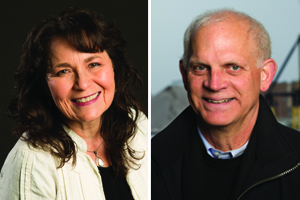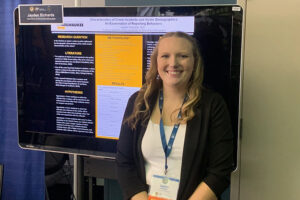Two faculty members from the University of Wisconsin-Milwaukee recently were named as Wisconsin Academy Fellows by the Wisconsin Academy of Sciences, Arts and Letters.
The Fellow Awards recognize educators, researchers, mentors, artists and civic or business leaders from across Wisconsin who have made substantial contributions to the cultural life and welfare of the state and its people.
Kimberly Blaeser, professor of English and Wisconsin poet laureate from 2015-2016, and J. Val Klump, dean of UWM’s School of Freshwater Sciences, are among those recognized for 2020. They are the fourth and fifth UWM faculty members to be named as fellows since the program began in 1982.

Blaeser is a Native American poet and a professor of English at UWM, where she teaches in the American Indian Studies program. She also is involved with UWM’s Electa Quinney Institute for American Indian Education.
Born in Billings, Montana, of mixed German and Anishinaabe (Chippewa) descent, she is a member of the Minnesota Chippewa tribe, and grew up on the White Earth reservation in north-central Minnesota.
Her collections of poetry include “Apprenticed to Justice” (2007), “Absentee Indians and Other Poems” (2002) and “Trailing You” (1994), which won the Native Writers’ Circle of the Americas First Book Award. Blaeser’s work has been recognized with grants and fellowships from the University of Wisconsin Institute on Race and Ethnology and Chicago’s Newberry Library, and she serves on the Poetry Fellowship Panel for the National Endowment of the Arts. Before earning her PhD at the University of Notre Dame, she worked as a journalist.
Klump joined UWM’s Center for Great Lakes Studies in 1980 and has earned millions in extramural grant money for his Great Lakes research since then. After the center morphed into the Great Lakes WATER Institute, Klump became its director in 2001. The institute became the research arm of UWM’s School of Freshwater Sciences in 2009, and Klump was named the associate dean for research before becoming dean in 2016.
A limnologist, or one who studies lakes, Klump earned a PhD in marine sciences from the University of North Carolina in 1980, after having finished a law degree from Georgetown University in 1975. His research on how nutrients and carbon are cycled in lakes has taken him from the deepest point in Lake Superior aboard a research submersible to the largest lake in the world – Lake Baikal in Siberia. His research includes the presence and dynamics of “dead zones” in Green Bay and the impact climate change has on their extent.
Currently, there are 93 living fellows. Past winners from UWM have included:
- Pradeep Rohatgi, College of Engineering & Applied Science (2014)
- Fern Caulker-Bronson, Peck School of the Arts (1990)
- Clifford Mortimer, Center for Great Lakes Studies (1982)
Fellows are chosen every two years a through an open nomination process which usually lasts for two months. Typically, a cohort includes five to seven fellows.
Established in 1870, the Wisconsin Academy aims to create a better world by connecting the state’s people and ideas across disciplines. It accomplishes that in a multifaceted way, showcasing contemporary art at the James Watrous Gallery, examining science and culture in Wisconsin’s People & Ideas magazine, and creating a public dialog about statewide challenges through the Wisconsin Strategy Initiatives. The academy also hosts fiction and poetry contests and supports the Wisconsin poet laureate.






